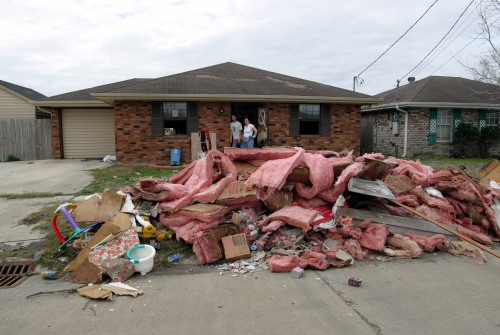
Mild forecast comes with reminder of hard lesson
June 5, 2012
Shutter service opens window on storm protection
June 5, 2012Hurricane preparation means protecting both hard copy and computer files that include financial documents and tax information.
With electronic record keeping, Joby Dion, owner of Uptown Computer in Houma said it is good to prepare in advance, before storms hit and equipment needs to be left behind because of an evacuation.
“Always have a backup,” Dion said. He recommended people always keep record of their records on either flash drives, which can be purchased for as little as $10, or external hard drives, which are priced from $60 and up.”
Off-site backups that store financial records and personal items, including electronic photographs, have benefits in case equipment has to be left in an evacuation.
“As a financial institution, we do have contingency plans in place to ensure that our customers’ financial information is protected and to minimize the duration and impact of any business interruption,” Synergy Bank Executive Vice President Ben Borne said. “All of our customer account details, balances and transaction histories are maintained at an off-site host system, and this information is backed up daily.”
Borne and Dion explained that banks and online record-keeping services make daily back-ups that are secure and in a separate location. Hot-site facilities are maintained in inland states. The facilities are pre-configured to run host system applications so that, in the event the host-system is rendered inoperable, processing can be restored in a reasonable timeframe.
“Our ability to actually utilize these back-up facilities is tested on an annual basis,” Borne said. “In a disaster situation, communications, including telephone, data and Internet, are all critical. We maintain several layers of redundancy and back-up means of communication to help ensure any disruption is minimized and we are able to perform critical functions. Maintaining communications with our customers and employees is also very important.”
Banks and other financial institution websites are maintained off-site, and have the ability to post updates remotely. Facebook pages are updated with important information.
“We also maintain an out-of-state, off-site answering service that can be activated at any time if necessary,” Borne said.
Regarding customer access to information for banks, it can be secured by enrolling for Internet banking and eStatements. These services are available to all customers at no charge, and enable secure, convenient access to their account information online from anywhere, even if our offices are temporarily closed due to an evacuation.
Banking customers are encouraged to test access to 24-hour telephone banking services. “We encourage customers to enroll in Direct Deposit with their employers,” Borne said. “This will help to ensure that their pay gets deposited to their accounts, even if they are unable to get to the bank or the bank is temporarily closed.”
Access to funds can be obtained with debit cards at thousands of ATMs around the world, as well as through merchants that accept point of sale transactions and offer a cash-back option.
Bills may also be paid online through Internet Banking service. “We recommend that customers set up overdraft protection in advance as well,” Borne said. “This would enable funds to be automatically transferred from one of their other accounts, or a line of credit, in the event the funds in their checking account are depleted.”
The Internal Revenue Service has also offered help in listing things business and homeowners should keep in consideration.
“Planning what to do in the event of a disaster is an important part of being prepared,” IRS spokesperson Dee Harris Stepter said. “The IRS encourages people to protect tax and financial documents, both personal and professional.”
Simple ways to protect financial and tax records begins with avoiding what could become a soggy paper trail. Take Advantage of paperless recordkeeping for financial and tax records is available with a variety of software packages.
Many people receive bank statements and other documents electronically. Doing so is an outstanding way to protect financial records, according to experts. Important tax records such as W-2s, tax returns and other paper documents can be scanned onto an electronic format.
“Be sure you back up your electronic files and store them in a safe place,” Stepter said. “Making duplicates and keeping them in a separate location is a good business practice.” Other options include copying files onto a CD or DVD or other electronic storage device.
When choosing a place to keep records, convenience to home should not be your primary concern. When disaster strikes, one’s home is also likely to be affected, as well as other nearby facilities nearby. Because of that, quick retrieval of records can become difficult and even impossible.
With electronic storage services, some offered by larger banks, keeping records safe away from storm prone areas is possible.
The IRS offers disaster loss workbooks for individuals (Publication 584, Casualty, Disaster, and Theft Loss Workbook) and businesses (Publication 584-B, Business Casualty, Disaster, and Theft Loss Workbook) to help individuals compile room-by-room lists of belongings or business equipment.
Documenting property helps with recall and verifies the presence of property to determine market value of items for insurance and casualty loss claims.
One option is to photograph or videotape the contents of the home or business, especially items of greater value. Photos and videotapes should be stored in a safe location away from the geographic area at risk.
Emergency plans should be reviewed and updated annually. Personal and business situations change over time and so do preparedness needs.
Individual taxpayers should make sure they are saving documents everybody should keep including such things as W-2s, home closing statements and insurance records.
When employers hire new employees or when a company or organization changes functions, plans should be updated accordingly and employees should be informed of the changes.
The IRS has information available to use if records are destroyed.
Stepter said immediately following a casualty, claimants can request a copy of a tax returns and all attachments by using Form 4506, Request for Copy of Tax Return (PDF).
Information about specific returns can be ordered by calling (800) 829-1040 or using Form 4506-T, Request for Transcript of Tax Return (PDF). There are no fees for transcripts, which are available for the current year.
Past returns are processed for the three prior years.
“That is also why [backup services] are a failsafe solution,” Dion said. “In a hurricane, as long as you’ve got two of these things on the list you will do good.”
A family guts their home following flood damage in Hurricane Katrina. Officials warn that people should safeguard and backup all of their financial records in case flood waters threaten an area’s homes.













